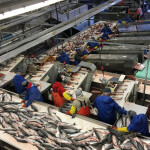At the end of May, the U.S. government announced preliminary countervailing duty (CVD) rates for shrimp imports for seven countries under investigation. The rates range from less than 1 percent to more than 60 percent.
U.S. shrimp processors have been petitioning for the duties, alleging the countries are receiving illegal subsidies from their governments.
However, according to Gavin Gibbons, director of media relations for the National Fisheries Institute (NFI), the shrimp markets that are asking for the duties and the shrimp markets affected by the price difference are not the same.
“There’s always been a clear difference in the market for fresh wild shrimp and frozen farmed shrimp, and this ruling does nothing to change that,” Gibbons told SeafoodSource. “The markets that are asking for the duties are totally different than the frozen farmed shrimp that is imported. It’s a different price range and seasonality — it’s apples and oranges.”
So in the end, it’s the consumers and not the industry that will take the biggest hit, said Gibbons.
“It’s disappointing that we see these duties considered at all,” said Gibbons. “Unfortunately the loser in all this is the American consumer. Shrimp is the most popular seafood item for American families and the cost will go up.”
Gibbons said the hope is that the higher prices may not be enough to change consumers' shrimp-buying habits since shrimp has been a really cost-effective way to feed seafood to families.
“But it’s definitely a cost that consumers are going to feel,” he said. “The prices will go up and stay up.”
How much shrimp prices actually increase depends on what the duties look like in the final round. The determination still has two more steps to go in a four-step process. So there’s hope that the duties would simply go away if the International Trade Commission (ITC) decides not to implement them at the current rates.
In order for the duties to be imposed, both the Department of Commerce (DOC) and ITC have to rule in their favor.
If the ITC rules there is no reasonable basis to determine that material harm has been done to the domestic industry, than the duties disappear.
“The one wrinkle is that usually the ITC process is country by country unless the ITC decides to ‘cumulate’ the imports from all countries in order to assess their overall impact on the domestic industry,” said Gibbons.
“In the original dumping case, in the sunset review, and in the preliminary phase of the current subsidy case, the ITC did cumulate imports so they will again in the final phase.”





